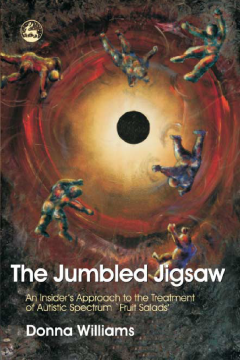
Additional Information
Book Details
Abstract
The Jumbled Jigsaw exposes autism spectrum disorders (ASDs) not as single entities but as a combination of a whole range of often untreated, sometimes easily treatable, underlying conditions. Exploring everything from mood, anxiety, obsessive-compulsive and tic disorders to information processing and sensory perceptual difficulties, including dependency issues, identity problems and much more, Donna demonstrates how a number of such conditions can combine to form a 'cluster condition' and underpin the label 'autism spectrum disorder'.
Donna Williams encourages and empowers families to look at what they can do to change their child's environment to address anxiety, overload and other issues. She also gives carers the necessary information to navigate the booming autism marketplace and demand the right tools for the job. The author also challenges professionals to adopt a multi-disciplinary approach to identifying and treating the cluster conditions that make up an autism spectrum diagnosis, and to improve service delivery to those in need.
The Jumbled Jigsaw is a call to modern society to take responsibility and accept diversity. It is written in a very human and user-friendly way for parents and for Auties and Aspies themselves, but it is also aimed at carers, professionals, policy-makers and service providers.
Pleasure and repeated cries of "eureka" were my reactions to reading this book in which Donna Williams explains the reality of difficulties I had witnessed in children on the autistic spectrum. I particularly liked the description of autistic spectrum disorders as a fruit salad - containing a range a range of ingredients in varying quantities, giving a distinct taste each time.
Community Care
The Jumbled Jigsaw: An Insider's Approach to the Treatment of Autistic Spectrum "Fruit Salads,' by Donna Williams, covers topics that will inform and educate practitioners along with educators of future practitioners who may want to use this book in their classrooms. I can imagine this book being used by counselling, clinical, and school psychologists who need to become better informed about the issues faced by parents of a child with this diagnosis. The book is user friendly and is easy to read. The author's writing style, coupled with language that is easy to understand, makes this a book that could be easily used by both professionals and families of children with this diagnosis... I feel this book does a wonderful job of explaining things to parents, and from a parent's point of view. Throughout the book, the author uses phrases that start with "I." This makes the book real to people, and they can begin to imagine the author actually in the situation being described. I would definitely use this book in a class I was going to teach to either parents or future clinicians. This book is very interesting and packed with case examples, interesting stories, and reader-friendly language that makes it easier for professionals and laypeople alike to understand.
PsycCRITIQUES of the American Psychological Association
The real strength of the book is to challenge practitioners to go beyond the label of autism in order to be a real help; I thoroughly enjoyed reading this book as it was challenging on every page, I think it will appeal to practitioners with a wide experience of children with autism and other complex mixtures of difficulties that do not fit neatly into conventional labels. As Donna herself commented her ideas will interest those with an open mind and holistic perspective.
NAPLIC
I would definitely use this book in a class I was going to teach to either parents or future clinicians. This book is very interesting and packed with case examples, interesting stories, and reader-friendly language that makes it easier for professionals and laypeople alike to understand. I encourage anyone who works with children with disabilities to read it to begin to put together the pieces of the puzzle that diagnoses like autism and autism spectrum disorder create for a child with this disability. No matter what language is used, helping a child create a better world for himself or herself is all that should matter.
PsycCRITIQUES
Donna Williams was born in Australia in 1963. She was assessed at two as psychotic, labelled disturbed and tested for deafness throughout childhood before being diagnosed as autistic in 1990. She was an internationally best-selling author with nine published books, an artist, singer-songwriter and screenwriter. One of the most well-known people with autism in the world, Donna was a renowned international public speaker, a qualified teacher and worked as an autism consultant.
Table of Contents
| Section Title | Page | Action | Price |
|---|---|---|---|
| Prelims (Foreword/ Preface) | |||
| Introduction: A history of Training for Transformation | |||
| Part One: Moving a mountain starts with a small stone | |||
| Part Two: Seeking the self | |||
| Part Three: Healing the wounds of war | |||
| Part Four: Listening into dialogue | |||
| Part Five: Freedom from patriarchy | |||
| Part Six: Crossing cultures, building bridges | |||
| Part Seven: Long march through the institutions | |||
| Part Eight: It doesn’t need to be like this | |||
| Back Matter (Epilogue/ Appendix/ Three poems) |
